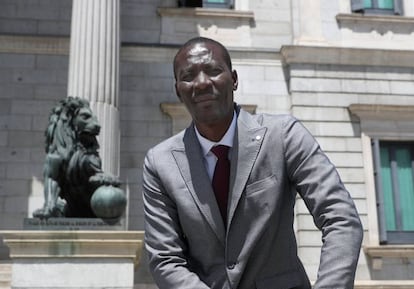From homeless to Congress: Meet the Spanish deputy who used to sleep on the street
Socialist lawmaker Luc André Diouf was once an irregular immigrant with nowhere to live, now he is a newly-elected member of parliament committed to fighting the rise of the far right

Senegal-born Luc André Diouf, 53, does not consider himself a symbol, but he is unlike any of Spain’s new lawmakers. Not only for the color of his skin – he is the second black person to be elected to Congress – but also for the hardship he experienced in the pursuit of his European dream.
Diouf arrived in Spain’s Canary Islands in 1992 on a tourist visa and became an irregular immigrant when the visa expired. Without proper paperwork, he soon ran out of money and was forced to live on just one meal a day. For over a month, he slept rough on Las Canteras beach in Las Palmas, Gran Canaria – the city where he was elected as a deputy for the Socialist Party (PSOE).
I got pneumonia from spending so much time sleeping on the street
Socialist deputy Luc Andrè Diouf
“I believe in this diverse and pluralistic Spain that is reflected in the fact I am among the 123 Socialist deputies,” he says, aware that he is now a role model for migrants who have managed to get Spanish nationality, those who hope to receive it, and the second-generation immigrants who were born in Spain but still feel marginalized.
Diouf’s debut as head of the PSOE’s refugee policy has coincided with the entrance of far-right group Vox in Congress, which won 24 seats the April 28 Spanish election. It is another reason why Diouf’s presence in the lower chamber is so significant. “It’s sad,” he says. “In other European countries where there is much more immigration, such as France or Italy, [other forces] neither accept nor embrace the extreme right. Spain has always been welcoming and it has been and still is a country of emigrants.”
Diouf adds, however, that he does not believe Vox will have much influence in Congress.
But while Diouf may be disappointed in the rise of Vox, he is also keen to point out that the Spanish state provided a safety net when he was down on his luck. “I got pneumonia from spending so much time sleeping on the street,” he says. “But I got treated in hospital which I appreciate, in the same way I appreciate the education I got here.”
As an irregular immigrant, Diouf soon ran out of money and was forced to live on just one meal a day
An economics graduate on arrival, Diouf completed a master’s degree in microfinance in Spain. For almost a decade, he was the immigration secretary in the Canary Islands for the Workers Commissions union (CCOO), an experience that catapulted him into politics.
His goal now is to make migration “fluid” in a bid to avoid unnecessary deaths and problems at the borders of the North African exclave cities Ceuta and Melilla. He also wants to push the European Union take responsibility for the migration crisis at Europe’s southern border. “It doesn’t make sense that the responsibility falls to Greece, Italy and Spain,” he says. “The EU has to become more involved so that immigration stops being a problem. Xenophobic political parties feed off immigration. Any xenophobic, racist, homophobic or anti-feminist act should be reported,” adds Diouf who believes that no concessions should be made to the extreme right.
English version by Heather Galloway.
Tu suscripción se está usando en otro dispositivo
¿Quieres añadir otro usuario a tu suscripción?
Si continúas leyendo en este dispositivo, no se podrá leer en el otro.
FlechaTu suscripción se está usando en otro dispositivo y solo puedes acceder a EL PAÍS desde un dispositivo a la vez.
Si quieres compartir tu cuenta, cambia tu suscripción a la modalidad Premium, así podrás añadir otro usuario. Cada uno accederá con su propia cuenta de email, lo que os permitirá personalizar vuestra experiencia en EL PAÍS.
¿Tienes una suscripción de empresa? Accede aquí para contratar más cuentas.
En el caso de no saber quién está usando tu cuenta, te recomendamos cambiar tu contraseña aquí.
Si decides continuar compartiendo tu cuenta, este mensaje se mostrará en tu dispositivo y en el de la otra persona que está usando tu cuenta de forma indefinida, afectando a tu experiencia de lectura. Puedes consultar aquí los términos y condiciones de la suscripción digital.









































